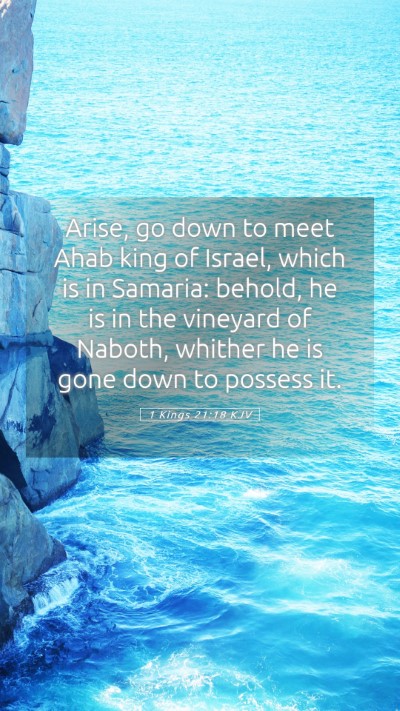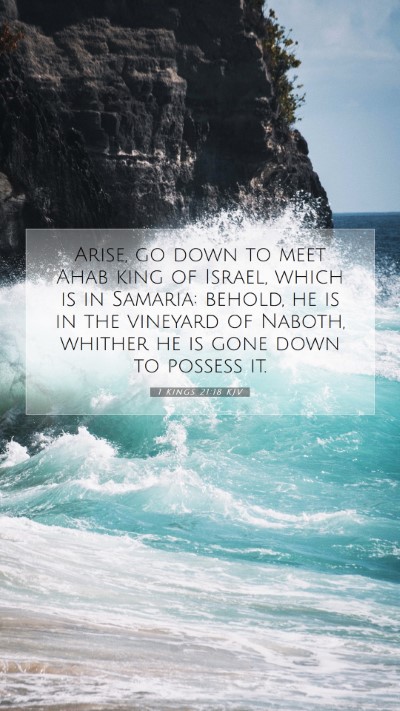Understanding 1 Kings 21:18
Bible Verse: 1 Kings 21:18 - "Arise, go down to meet Ahab king of Israel, which is in Samaria: behold, he is in the vineyard of Naboth, whither he is gone down to possess it."
Bible Verse Meanings
This verse serves as a pivotal moment in the narrative of King Ahab and the prophet Elijah. The call to "arise and go down" signifies a divine command and the urgency within God’s plan. The vineyard of Naboth represents Ahab's desire for possession, which leads him into sin and injustice.
Key Insights from Commentaries
-
Matthew Henry:
Henry emphasizes the moral implications of this command. He notes that Ahab's greed and subsequent actions are reflective of a deeper spiritual corruption within Israelite leadership. The vineyard symbolizes not just land but the righteousness that Naboth held dear against Ahab's oppressive desires.
-
Albert Barnes:
Barnes discusses the context of Naboth’s vineyard as a vital inheritance tied to the Israelite identity. The verse underscores Ahab's unjust intentions and foreshadows the grave consequences that will follow this act of coveting. His study suggests that God's judgment is imminent against the backdrop of sin and rebellion.
-
Adam Clarke:
Clarke articulates the implications of Ahab's actions in a broader historical context, focusing on the nature of kingship and moral accountability. He interprets this event as a reflection of the dangers of unchecked authority and how the lust for material possessions leads to moral downfall.
Bible Verse Explanation
The verse sets the stage for conflict and moral teaching within the text. Ahab's desire to "possess" the vineyard becomes a symbol of the greater issue of idolatry and disobedience against God. Here, we find a lesson on the danger of allowing desires to surpass ethical frameworks within one’s life.
Significance in Scripture
The direction given to Elijah not only frames the narrative but serves as a divine instruction highlighting God's judgment against Ahab. It opens avenues for understanding the consequences of sin in the lives of leaders, a theme prevalent within the Old Testament.
Application of This Verse
For contemporary readers, 1 Kings 21:18 prompts reflection on personal desires and their alignment with God's will. It challenges believers to consider their motivations and actions, ensuring they do not lead to injustice or unethical decisions in pursuit of material gain.
Cross References
- Exodus 20:17 - "Thou shalt not covet..." - A direct correlation to the desires of Ahab.
- James 4:2 - "Ye lust, and have not: ye kill, and desire to have..." - Reflecting on the destructiveness of unchecked desires.
- 1 Kings 21:25 - The verse states that there was none like Ahab who did sell himself to work wickedness.
Biblical Exegesis and Context
Examining the historical context of Israel during Ahab’s reign reveals a time of moral decline and idolatry, emphasized in the prophetic warnings that Elijah brings. Understanding the cultural and historical setting enhances our comprehension of the gravity of Ahab and Jezebel’s actions.
In-depth Bible Verse Analysis
This passage invites readers to engage with the complexities of power, desire, and justice, emphasizing that leaders are held to significant moral standards. It also invites reflection on personal conduct in light of authority and influence.
Conclusion
1 Kings 21:18 is a gateway to understanding deeper biblical themes of morality, leadership, and divine justice. It poses critical questions about human nature and ethical decision-making that remain relevant for today’s readers seeking Bible verse meanings and interpretations.


